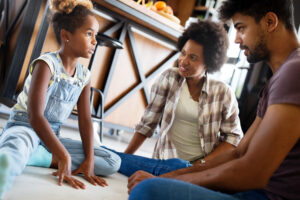Being homebound to limit the spread of coronavirus (COVID-19) provides us an opportunity to spend more time with our family. However, children and adults alike can suffer from boredom and frustration.
Young children are especially frustrated by being isolated from peers and teachers. And things can get tense around the house when you don’t have a lot of personal space.
Here are some tips to help children feel safe and secure during this stay-at-home time.
Support the family structure
- Plan physical activities that can be done in and around the house.
- Maintain a healthy diet, good sleeping habits, and proper hygiene practices (e.g., regularly washing hands, covering mouths when coughing and sneezing, avoiding contact with face).
- Establish and maintain routines related to bedtimes, meals and exercise.
- Ensure basic supplies (e.g., food, water, soap, first aid provisions) and medications are readily available.
- Encourage kids to participate in household chores — it is an easy way to be active and it encourages a sense of accomplishment.
- Plan enjoyable family activities, such as games, movies and exercise.
- Listen to uplifting music or inspiring podcasts.
- Dance!
- Model patience and tolerance for your children (breathing, taking a moment, etc.) and lead kids in relaxation techniques to reduce stress.
- Limit the use of alcohol and tobacco by adult family members.
- Participate in faith traditions at home or online if it is a usual family activity.
Communicate openly
 During times of uncertainty, open communication is critical to helping children feel safe and secure.
During times of uncertainty, open communication is critical to helping children feel safe and secure.
- Stay informed by using accurate sources of information (see below for resources) Arkansas Department of Health and the Centers for Disease Control and Prevention.
- Prevent misinformation by sharing what we know and don’t know about the virus.
- Explain the reason for choosing to stay home in an age-appropriate and positive manner to children. Adults in the home must gauge what their children can understand.
- Avoid terms like “Chinese virus” when referring to coronavirus or COVID-19. These types of terms increase stigma about the disease.
- Remind children that this situation is temporary. Thank them for helping others (we are helping to keep your friends, their families and other people safe).
- Allow children to feel comfortable expressing their concerns and asking questions. “So, what have you heard about COVID-19?” “What are your friends saying about this time?” are two simple questions you can ask. Then let the kids talk.
- Reassure children they will receive medical care if they become ill.
- Check-in with children frequently to address newly emerging fears and misconceptions.
- Limit and closely monitor children’s use of media to reduce potential confusion, worry and fear.
Connect to helpful support
Being homebound can cause feelings of isolation. Staying connected helps alleviate stress and increase our sense of value.
- Develop plans for maintaining children’s connections to friends and other family members via phone or the internet.
- Ensure your child’s medical team is involved to help monitor any pre-existing conditions.
- Use available homeschool or distance learning opportunities that combine the educational needs of children with their physical and mental health needs.
- Contact a mental health professional if you notice signs of anxiety and depression in children, including changes in appetite, sleep disruptions, aggression, irritability and fears of being alone or withdrawn.
Resources
Centers for Disease Prevention and Control (CDC)
CDC disease information specifically for children
Red Cross
World Health Organization (WHO)
Academy of American Pediatrics (AAP)

